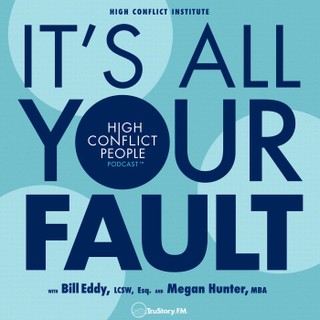
Be Assertive, Not Aggressive: Winning in Family Court with Judge Bruce Cohen (ret.)
It’s All Your Fault: High Conflict People
Intro
This chapter introduces a groundbreaking training program aimed at leaders dealing with high-conflict situations. The hosts discuss the importance of managing challenging behaviors and equipping individuals with strategic tools for effective leadership in high-stakes environments.
Assertiveness vs. Aggressiveness in Family Court: A Judge's Perspective
In this enlightening episode, High Conflict Institute co-founders Bill Eddy and Megan Hunter welcome back retired Judge Bruce Cohen to discuss the critical differences between assertiveness and aggressiveness in family court proceedings. With decades of combined experience in family law, social work, and conflict resolution, the trio explores how presentation style can significantly impact case outcomes, especially in custody disputes.
Understanding the Impact of Communication Style
Judge Cohen shares invaluable insights about how judges perceive different communication approaches in the courtroom. He emphasizes that while both assertive and aggressive styles express thoughts, feelings, and needs, assertiveness does so respectfully while aggressiveness relies on blame and confrontation. Bill and Megan explore this distinction through real-world examples and practical applications.
The Role of Personality Disorders in Court
The discussion delves into Bill's book Splitting: Protecting Yourself While Divorcing Someone with Borderline or Narcissistic Personality Disorder. The hosts and Judge Cohen examine how to address concerning behavior patterns without falling into the trap of amateur diagnosis or labeling. They stress the importance of focusing on specific behaviors and their impact rather than clinical terms.
Effective Court Communication
Bill shares his expertise on writing for court, offering practical tips for presenting information effectively. Judge Cohen provides valuable feedback from the bench's perspective, confirming the importance of clear, organized, and relevant presentation of facts. The conversation highlights how proper documentation and presentation can significantly influence court outcomes.
Questions we answer in this episode:
- What's the difference between assertive and aggressive communication in court?
- How do judges perceive different communication styles?
- When should personality disorder concerns be raised in court?
- How should evidence be presented most effectively?
- What communication mistakes commonly harm court cases?
Key Takeaways:
- Focus on specific behaviors rather than diagnostic labels
- Present your strongest evidence first rather than chronologically
- Start documents by clearly stating what you want
- Respond to false allegations with measured, factual responses
- Use headers and organized presentation in court documents
This episode provides essential insights for anyone involved in family court proceedings, whether as a party, attorney, or helping professional. The combination of judicial perspective, clinical expertise, and practical experience offers listeners a comprehensive understanding of effective court communication strategies.
Links & Other Notes
- CLASSES
- Conflict Influencer (live group class)
- Writing for Court: 10 Tips for Persuading Decision-Makers (self-directed 1-hour course)
- BOOKS
- ARTICLES
- SIGN UP FOR NEWSLETTER
- OUR WEBSITE: https://www.highconflictinstitute.com/
- Submit a Question for Bill and Megan
- All of our books can be found in our online store or anywhere books are sold, including as e-books.
- You can also find these show notes at our site as well.
Note: We are not diagnosing anyone in our discussions, merely discussing general patterns of behavior. Nor are we providing legal of therapeutic advice. Please seek the assistance of your local professionals to seek help.
- (00:00) - Welcome to It's All Your Fault
- (00:41) - Assertiveness vs. Aggressiveness
- (12:41) - Easy to Read?
- (14:55) - The Splitting Book
- (19:09) - Court Experience
- (22:06) - Patterns of Behavior
- (24:37) - How to Present
- (26:52) - Self-Represented Cases
- (28:40) - Writing for Court
- (42:34) - Get Away from the Terms
- (44:26) - Wrap-up
- (44:54) - Reminders & Coming Next Week: When Your Friend or Family Is an HCP


